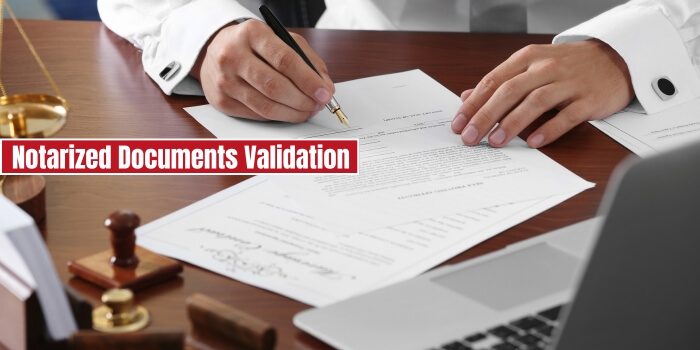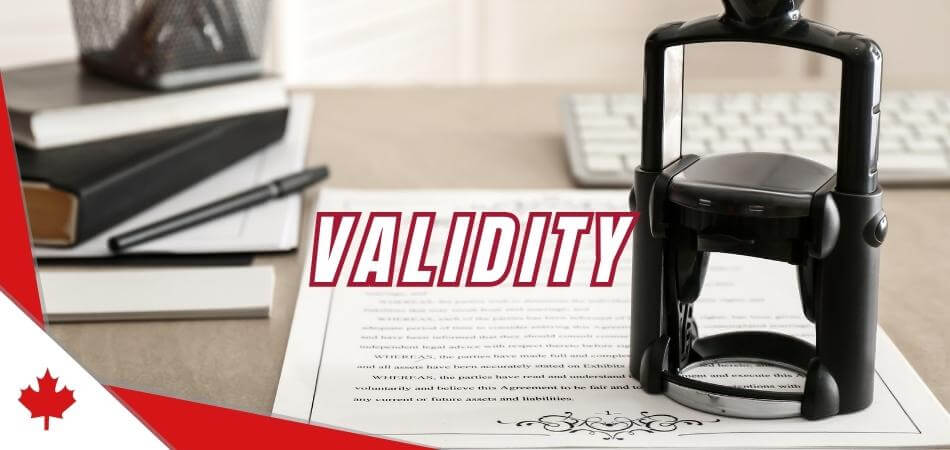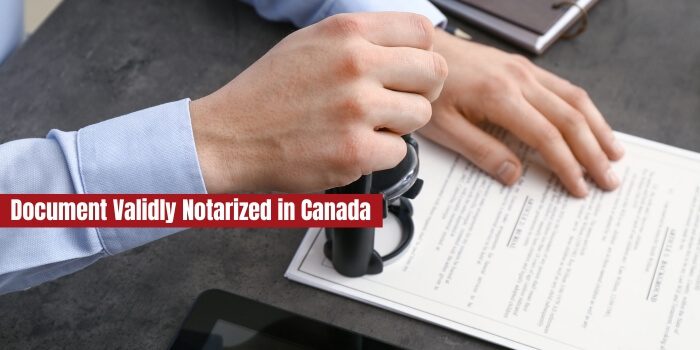The validity of legal documents is a paramount concern for individuals and businesses, affecting everything from property transactions to personal agreements. However, the question remains: How long is a notarized document valid in Canada?
In Canada, a notarized document stays active. No expiration date is associated with the notary stamp or seal, giving the document perpetual validity, provided the notary had a valid commission by the Provincial or Territorial government.
This remarkable aspect of Canadian law simplifies various legal processes and offers a sense of permanence and trust in notarized documents.
What Does it Mean by Notarized Documents Validation?
Notarized documents play a vital role in the legal system, providing a trusted means to verify the authenticity of signatures and contents. The validation of notarized documents ensures that both parties adhere to the established legal principles.

In many countries, notarized document validation is a process performed by a notary public, a person authorized by the government to act as an impartial witness. The notary public verifies the identity of the person signing the document and ensures that the signature is given willingly and without coercion. By placing an official seal or stamp on the document, the notary public attests to the document’s authenticity and the signatory.
When documents get notarized in Canada, they carry a unique attribute, they never expire. This permanence applies as long as the notary had a valid commission by the Provincial or Territorial government at the time of notarization. In this particular way, notarized document validity in Canada receives an extended value. Thus, the Canadian approach to notarized documents’ validation provides a lasting assurance of authenticity and legal acceptance, transcending time and reinforcing trust in legal proceedings.
How Long Is a Notarized Document Valid in Canada?
Notarized documents play a crucial role in legal matters across Canada. Their validity is often questioned, yet the rules surrounding it are quite clear.
In Canada, notarized documents are characterized by a lack of expiration. It means there is no specific time frame after which the document becomes void. The key to this indefinite validity lies in the notary’s valid commission by the Provincial or Territorial government at the time of notarization.
The absence of an expiration date on the notary stamp or seal extends to traditional and online notarizations. It remains valid if the notary’s commission was in good standing when the document was notarized. This unique aspect of Canadian law provides certainty and permanence to legal documents.
However, it’s essential to recognize that while the notarization itself does not expire, the content within the document must still adhere to relevant laws and regulations. A notarized document may become legally obsolete if it conflicts with changes in the law or personal circumstances.
Therefore, while the notarization remains valid, the practical applicability of the document may change over time, depending on the specific context and nature of the agreement.
Purpose of Notarization in Canada
Notarization serves as a critical legal tool in Canada, ensuring the authenticity and integrity of documents. Documents can be notarized in a few ways. Attendees often ask about the processes of document notarization online in Canada which serves the primary purpose of document notarization. However, understanding its purpose requires a detailed examination of various aspects.
Authentication of Signatures
- Notarization confirms that the signature on a document is genuine and belongs to the person who signed it.
- The notary public verifies the signer’s identity using government-issued identification.
- This process helps prevent forgery and unauthorized signatures on vital documents.
Witnessing Documents
- Notaries often serve as impartial witnesses to the signing of legal documents.
- By witnessing, they ensure all parties understand the document and sign voluntarily.
- This enhances the legal integrity of transactions and agreements.
Preventing Fraud
- The notarization process acts as a barrier against fraudulent activities.
- By verifying identities and witnessing signatures, notaries make Fraud more difficult to execute.
- This function adds extra protection to personal and business transactions.
Facilitating International Transactions
- Notarized documents are often required in international business and legal transactions.
- Notarization ensures foreign entities can trust the documents’ authenticity and the signers’ identities.
- This trust fosters smoother international dealings and enforcing agreements across borders.
Legal Compliance and Record-keeping
- Certain documents must be notarized to comply with specific Canadian legal requirements.
- Notarization creates an official record that may be crucial in legal disputes or proceedings.
- This legal acknowledgment ensures that documents meet the standards set by law and can be relied upon if challenged.
The purpose of notarization in Canada extends beyond mere formality, it is a multifaceted process that adds credibility, security, and international acceptance to documents. By enhancing trust and legal compliance, notarization is foundational in various personal and commercial contexts throughout the country.
Types of Documents That May Be Notarized
Notarization is a process that affirms the authenticity of various documents. It’s essential in various aspects of Canadian life, and here are some key types of documents that may require notarization:
Legal Documents
Legal documents like wills and contracts often need notarization to verify the parties involved. Notarization provides a witness to the signing and an official record of the agreement. It enhances the legal standing and enforceability of these documents in courts.
Business Documents
Business-related documents such as partnership agreements and articles of incorporation may require notarization. Notarization ensures that all parties act in good faith and understand the terms. This process adds credibility and can facilitate business operations and transactions.
Foreign Documents
Documents originating from other countries, such as marriage certificates or educational documents, may need notarization in Canada. Notarization verifies their authenticity and can facilitate their acceptance within Canadian jurisdiction. This is particularly important for immigration, marriage, or educational purposes within Canada.
Death Certificates
Notarizing a death certificate ensures its authenticity and helps in legal proceedings. It is often a necessary step in settling estates and accessing death benefits. This validation can simplify what is often a complex and emotionally taxing process.
Powers of Attorney
Powers of Attorney (POA) grant someone the legal authority to act on another’s behalf. Notarization of a POA confirms the identity of the grantor and the acceptance of responsibility by the grantee. It establishes the legitimacy of this profound legal arrangement and ensures it complies with relevant laws.
Notarization in Canada extends to a broad array of documents, adding a layer of legal assurance and integrity to these vital instruments. By understanding what documents may require this process, individuals and businesses can better navigate their legal obligations and protections.
The Legal Requirements for a Document Validly Notarized in Canada
The legal requirements for notarizing a document in Canada encompass various factors that assure the document’s authenticity and compliance. Here’s a breakdown of the key elements that must be fulfilled.
Type of Document in Question
The specific type of document being notarized in Canada has a direct impact on the requirements for notarization. Different documents, such as wills, contracts, or powers of attorney, come with unique legal considerations and procedures. The notary public must be aware of the particular requirements for the document in question, as they vary depending on its nature and intended purpose.
Unsigned Document Requirements
For a document to be validly notarized in Canada, it must be presented in its final form and remain unsigned until the notary public witnesses the signature. Any alteration or signing outside the notary’s presence can invalidate the notarization. This requirement ensures that the notary attests to the specific act of signing by the identified party, reinforcing the document’s authenticity.
Authentic Signatures on the Document
Confirming the authenticity of the signatures on a document is a central aspect of notarization. It involves verifying the signer’s identity using a government-issued ID and ensuring that the signature on the document matches the one on the identification. This critical step helps prevent forgery and unauthorized signatures, further strengthening the integrity and credibility of the notarized document.
Specified Requirements by the Province or Territory
Canada’s legal system includes various notarization requirements specific to different provinces and territories. Depending on the jurisdiction, there may be additional rules, forms, fees, or procedures that must be followed. Awareness of and complying with these region-specific regulations ensures the legal validity of the notarized document within the particular province or territory.
It can encompass a wide array of considerations, from the qualifications of the notary public to the way documents must be handled and stored, reflecting the diverse legal landscape across Canada. In specific provinces, they may require the validity of previous notarized invitation letter as well. Together, these requirements create a robust framework that governs the notarization process in Canada.
By understanding and adhering to these rules, individuals and entities can ensure that their notarized documents are accepted and enforceable under Canadian law.
FAQs
Here is a list of some FAQs related to the topic. Our experts have answered them with adequate information to help you understand the validity of notarized documents in Canada.
How Long is a Notarized Document Valid in Canada?
Ans. A notarized document in Canada does not have an expiration date. However, its relevance depends on the type of document and the purpose it serves. Some institutions may require more recent notarization for specific uses.
Can a Notarized Document Be Rejected for Being Too Old?
Ans. Yes, certain organizations or authorities may require a document to be notarized within a recent timeframe. It is best to confirm with the requesting party about any validity requirements.
Does a Notary’s Stamp or Seal Expire in Canada?
Ans. No, the notary’s stamp or seal itself does not expire. However, the notary’s commission or authority may have an expiration date, so ensure it was valid at the time of notarization.
Are There Any Documents That Require Periodic Notarization in Canada?
Ans. Yes, certain legal documents, like affidavits or financial statements, may require periodic notarization depending on their purpose. It is advisable to check with the specific institution for requirements.
Can a Notarized Document From Another Country Be Used in Canada?
Ans. Yes, foreign notarized documents can be used in Canada, but they may need to be authenticated or legalized. The process can vary depending on the type of document and its intended use.
Final Words
In learning about the validity of notarized documents in Canada, we discovered they have an infinite life expectancy. Understanding the legal landscape surrounding notarization in Canada raises the crucial question, “How Long Is a Notarized Document Valid in Canada?”
As we’ve explored, the answer is quite reassuring. In Canada, a notarized document does not expire and remains valid indefinitely as long as the notary has a reasonable commission at the time of notarization. This perpetual validity, covering various documents, promotes trust and legal compliance and facilitates domestic and international transactions. It’s a unique aspect of Canadian law that simplifies legal processes and offers peace of mind to those relying on notarized documents.







